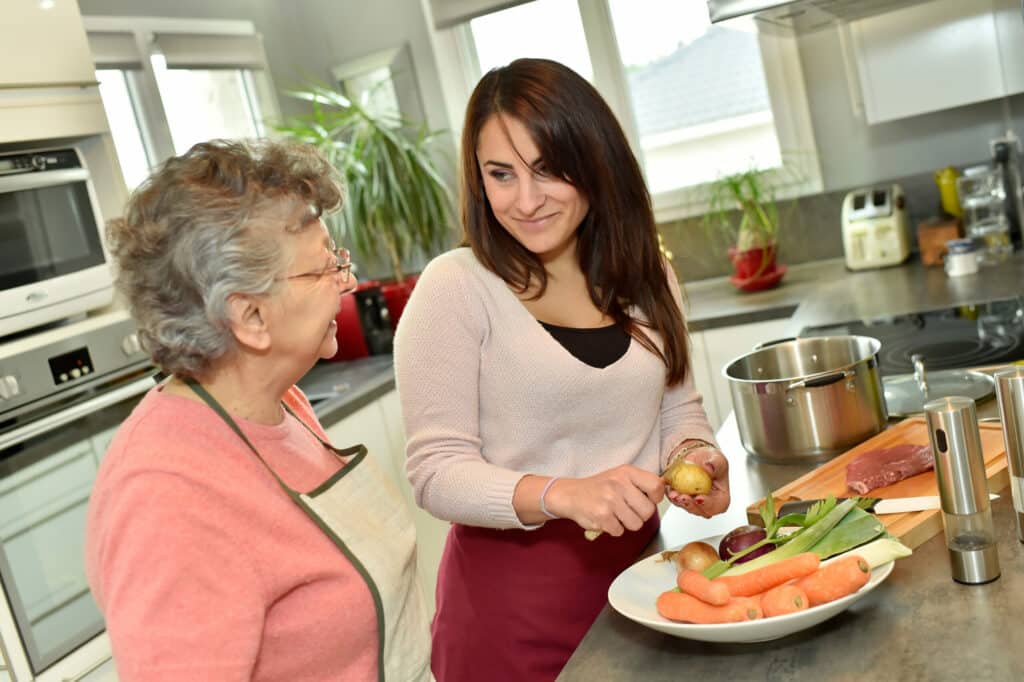Many seniors can’t stomach the foods they once enjoyed. As a result, many require smaller, more frequent meals. Others have dietary restrictions for one reason or another. Some find chewing or swallowing more difficult. And many are pickier eaters than they were in years past.
This poses a bona fide challenge for those who cook for mom or dad. As the default caregiver, you’ve added “chef” to your already long list of duties. And even if you love to spend time in the kitchen, meal preparation can take on a whole new (and stressful) dimension when a parent starts refusing to eat what you cook, wasting food, or losing weight. After all, conscientious caregivers want to do the right thing and serve nutritious meals, but it can get exhausting, if not expensive.
How do you avoid the inevitable trap of cooking one thing for yourself and your family and another for a parent? It can be done but requires a lot more planning.
One Meal, Two Ways
Try setting aside one serving before completing the full recipe. For example, before the final ingredients go into that chicken dish, pull a piece to serve plain or with a classic gravy. Likewise, divide pasta sauces before adding the whole gamut of spices. When baking virtually anything, make one full version and a miniature — minus the offending elements. Roasting tender-crisp veggies? Boil some stovetop until they’re well done (or microwave the roasted edition further).
It can be easier to plan your meal and then figure out how to tone down their portion than making an entirely separate entree. But, unfortunately, it may come to that. If it does, seek simplicity in terms of palate and preparation.
Plan for Leftovers
Dust off the crockpot. Slow-cooked meats are fork-tender and fall apart, making them easy to eat (no cutting!) and easier to chew and digest. A chicken or pot roast yields leftovers that can be made into delicious casseroles, soups, sandwiches, and more. The crock is a time-saving, money-saving, and sanity-saver for busy caregivers.
When baking anything (even desserts!), take advantage of the remaining oven space and pop in acorn squash, foil-wrapped potatoes, or a pot pie. They often can cook right along with the evening dinner and be eaten within a day or two.
Seek Time-Savers
Stock the pantry and freezer with pre-cut, prepared, and frozen ingredients so you can whip up something in a jiffy. Avoid overly processed foods and freezer dinners, but don’t discount the value of frozen vegetables, canned salmon, simmer sauces, cubed potatoes, and cooked rice. Also, many grocery stores offer fresh, ready-to-cook meals that you pop into the oven. These are usually found in the meat section.
Please Their Palate
Strive for meals packed with flavorful, calorie-dense ingredients that are soft and nutritious. Avocados, sweet potatoes, squash, eggs, broccoli, bananas, oatmeal, and fish are excellent choices — and many can be combined. Millennials may have invented avocado toast, but it’s a terrific option for seniors, whether for breakfast, lunch, or dinner. Likewise, a veggie-laden quiche or frittata in the morning becomes tomorrow’s scrumptious supper.
Left to their own devices, many seniors will scrimp on nutrition due to insufficient funds, inability to cook, or mere lack of interest after cooking for so many years. Then, without a willing and able caregiver, they turn to processed foods, start losing weight, or complain. And that’s probably where you came in.
While it can be challenging, there are ways to reduce your time in the kitchen, cut waste, and feel good about your role. Perhaps their full tummy and a thank you will make an effort worthwhile.


